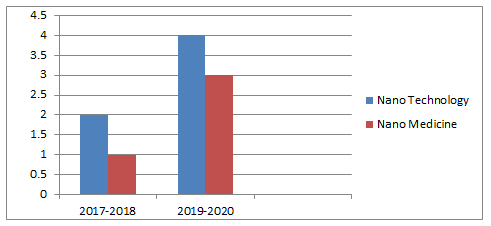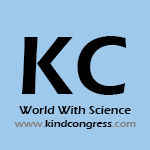With the success of Nano medicine meet 2019 which was scheduled in Istanbul, Turkey. We are delighted to announce the upcoming 28th International Conference on Nano medicine and Nano materials which is going to be held in Istanbul, Turkey during June 9-10, 2020. The conference is focused on the theme “Enlighten your Future with Nanomedicine and Nanomaterials for the brighter and advanced life”.
ME Conferences organizes the events every year across UK, Europe, Asia, Middle East, Australia and USA and bring the top people like Researchers, Associations, Societies, Scientists, Young Researches, Students, Engineers, Professors, and Research Scientists to provide the people with the best information and knowledge. ME Conferences organized 300+ Conferences, 500+ workshops and 200+ Symposiums on Clinical, Medicine, pharms, Science and technology.
Nano Med 2020 gadders all the people at one place to share the ideas and innovative thoughts to make the world how important is the Nano Med 2020 and make the Nano technology as there future.
Who Attends?
-
Nanotechnologists
-
Pharmacists
-
Nano Scientists
-
Pharmaceutical Companies and Markets
-
Academic Professionals
-
Nanotechnology Students, Scientists
-
Nanotechnology Researchers
-
Nanotechnology Faculty
-
Nanotechnology Associations and Societies
-
Training Institutes
-
Manufacturing Medical Devices Companies
-
Nanotechnology Engineers
-
Industrial Professionals
-
Toxicologists
Nano medicine may be a branch of drugs that applies the knowledge and tools of nanotechnology to the prevention and treatment of disease. According to the National Institute of Health, Nano medicine is a clinical application to nanotechnology, which refers to highly specific medical intervention at the Nano-scale for screening, diagnosis, and treatment of biological systems.
Nano materials are chemical substances or materials that are manufactured and used at a really small scale. It’s one unit small-sized (in a minimum of one dimension) between 1 to 100 nm (the usual definition of Nano scale) measured in kelvin. They’re small particles that you simply can't see with the naked eyes, therefore they're called Nano. The Nano was founded by Dr. Henry Nano. Nano materials are used in the manufacturing processes, products and healthcare including paints, filters, and insulation and lubricant additives.
Although various nanoparticles are being gradually developed in various sectors of the economy, there is increasing attention in the environmental and biological safety linked to their preparation. Green nanotechnology is to change the biological systems to green approaches to nanomaterial production, while preventing any related toxicity. Due to the large number of toxic chemicals and extreme environments employed in the physicochemical production of these nanoparticles, green methods employ the use of biological sources. Through mixing the ideologies of green chemistry and engineering, green nanotechnology can yield harmless and eco-friendly metal nanoparticles that do not use lethal chemicals in their production. This is a comprehensive study of the types of phytochemicals used in the production of nanoparticles with proteins, polysaccharides vitamins, glycosides essential oils, and phenolic-based chemicals. It also offers the preparation approaches used for different biological sources. Generally, the key role of natural plant biomolecules is tangled with the bio reduction of metal salts during nanoparticle production.
Nano engineering is a branch of engineering that contract with all features of the design, building, and use of engines, machines, and structures on the Nano scale. At its core, Nano engineering deals with nanomaterial’s and how they interact to make useful materials, structures, devices and systems.
Nano engineering is not precisely a new science, but, rather, an allowing technology with applications in most industries from electronics, to energy, medicine, and Nano biotechnology. The term Nano engineering is the applicant and similar to nanotechnology; the former technically focuses more closely on the engineering aspects of the field, as opposed to the wider science and general technology features that are included by the latter.
Nano robotics is the technology that is used to construct machines and analyzing size ranging 0.1-10 micrometers. Generally Nano robots are of great importance in the research and development phase. The key drive of Nano robots is to bring out a specific task extremely and with care at Nano scale dimensions. Nano robots are used in medical field to abolish cancer cells and for other purposes.
Molecular Nanotechnology is nanotechnology using "molecular manufacturing”. It’s a technology supported to create structures to complex. It includes relating ideologies established by chemistry, different nanotechnologies, and therefore the molecular machinery of life with systems engineering principles found in current Nano scale industrial unit.
The nanophysics are the subject deals with the size scales of quantum mechanics and macroscopic physics ruled by the laws of Newton and Einstein. The exact definition of nanophysics is the physics of structures and objects with proportions in the nanometer range or of phenomena happening in nanoseconds. The program on Nanomaterial and Nanophysics pays attention on fabricating, designing, and controlling materials and components with dimensions on the Nano scale i.e. from 1 to 100 nm.
Nanotechnology treat the cancer by abolishing tumors causing less harm to healthy tissue and organs, as well as the detection and elimination of cancer cells before they form tumors. Maximum efforts to improve cancer treatment through nanotechnology are at the development or research stage. However there are numerous companies and universities around the world functioning in this area. The next section offers examples of the research underway, a limited of the methods discussed have reached the pre-clinical or clinical trial stage.
Tissue engineering is a rapidly growing scientific area, which is used to repair, create, and/or replace cells, organs and tissues by using cell and/or combinations of cells along with biomaterials and/or biologically active molecules to produce body's native tissue/tissues. From tissue engineering current therapies got revolutionized and life quality of several millions patient got improved. In the tissue engineering the cells are seen closely and seeded on bio mimicked scaffold providing adhesive surfaces, then cells deposit their own protein to make them more biocompatible, but the growth was not properly, due to absence of functional cells, low strength of engineered cells, not immunologically compatible with host and Nutrient limitation are a classical issue in the field of tissue and tissue engineering.
Nano therapy is with in branch of Nano medicine that involves using nanoparticles to deliver a drug to a given target location within the body so on treat the disease through a process referred to as targeting drug delivery for cancer therapeutics. Much of the research in Nano therapy has been largely directed towards cancer therapy.
Nano electronics is the use of nanotechnology in electronic modules. The Nano electronics are the set of materials and devices. They are so small that inter-atomic interactions and quantum mechanical properties got to be studied extensively. And Nano metrology is the concept for developing in Nano technology.
Nano-electronics are the building capacities of gadgets while we lessen their weight and control utilization. Enhancing show screens on gadgets. This includes lessening power utilization while diminishing the weight and thickness of the screens. Specialists are adding to a kind of memory chip with an anticipated thickness of one terabyte of memory for each square edge or further prominent. Lessening the measure of transistors utilized as a part of coordinated circuits.
The main current applications of Nanotechnology for surgeons are within the areas of development of surgical implants using Nano materials, Imaging, Drug delivery system and development of Tissue Engineering products, like scaffolds with enhanced material–cell interaction. An example of this is often the event of a scaffold for delivery of stem cells to exchange defective retinal pigmented epithelial cells in age-related degeneration. In Dentistry research has been done, liposomal Nanoparticles that contained collagenase and performed tests with them in rats, and located compared to standard surgery, collagenase weakened the collagen fibers, making it easier to shift the teeth afterward with braces.
The science and novelty of Nano materials has made tremendous energy and needs is the maximum in recent couple of years. The Bio-nanomaterial’s and biomedical devices are significant steps in the characterization, arrangement and abuse of Nanoparticles, Nanowires, Nanotubes, Nano rods, Nano crystals, Nano units and their congregations.
DNA and RNA Nanotechnology are an opinions and concepts concerning newly emerging field of bio-Nano-technologies. DNA nanotechnology is that the design and manufacture of artificial macromolecule structures for technological uses. In this field, nucleic acids are used as non-biological engineering materials for nanotechnology instead of because the carriers of genetic information in living cells and Nano particles. DNA became an important artifact in macromolecule nanotechnology; RNA continues to emerge as viable alternative material with its own distinct advantages for Nano construction.
Nanotechnology is one of the important concept where we can use several applications to enhance the environment and to supply more efficient and cost-effective energy, as generating less pollution during the material manufacture, producing solar cells that generate electricity at a competitive cost, cleaning up organic chemicals polluting groundwater, clearing volatile organic compounds from the air.
Nanotechnology is a beneficial technology across various industrial domains, including communication, medicine, transportation, agriculture, energy, materials & manufacturing, consumer products, and households. Emerging use cases and application is predicted to be one of the key factors contributing towards the expansion of nanotechnology market size.
By the info of International Trade Center (ITC), the trade of semiconductors including diodes and transistors was valued at $119.02 billion in 2018. This also reflects with the booming semiconductor market that had a valuation of $420 to $430 billion as of 2018, and thus the demand for semiconductors goes to observe a CAGR of 10% to 12% over the forecast period 2019-2025. Similarly, other electronic products that utilize nanotechnology are witnessing a mild growth in terms of revenue.
The use of nanotechnology within the healthcare sector has created some exciting possibilities for the vendors within the nanotechnology market. Nanotechnology is predominantly utilized in drug delivery as nanoparticles help to deliver drugs and other substances to specific cells in human bodies. The advancing use of nanotechnology in drug development is simply going to witness growth within the longer term.

Nanomedicine Meet 2019
The International Conference on Nanomedicine and Nanotechnology in Health Care hosted by ME Conferences was held during May 27-28, 2019 Istanbul, Turkey on the theme “Role of Nanotechnology in Human’s Life”.
The conference marked its start by an opening ceremony which included an introduction by the Honorable Guest:
-
Roger M Leblanc, University of Miami, USA
We were overwhelmed by his generous response.
The eminent personalities at the conference were
-
Julia Durzynska, Adam Mickiewicz University, Poland
-
Ariel Franco, Nanosono R&D Center, Israel
-
Zehra Edis, Ajman University, UAE
-
Oluwadamilola Oshodi, University of South Florida, USA
-
Wesley N Omwoyo, Vaal University of Technology, South Africa
-
Guillermo Valdes Mesa, Havana University Center, Cuba
ME Conferences wishes to acknowledge with its deep sincere gratitude all the supporters from the Editorial Board Members of our Open Access Journals, Keynote speakers, Honorable guests, Valuable speakers, students, delegates and special thanks to the Media partners for their promotion to make this event a huge success.
We hope your favorable support will make next series 28th International Conference on Nanomedicine and Nanomaterials to be held during June 9-10, 2020 Istanbul, Turkey to a grand success event.
Email: [email protected]










